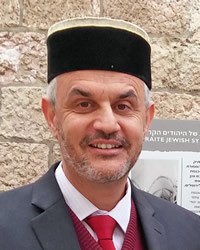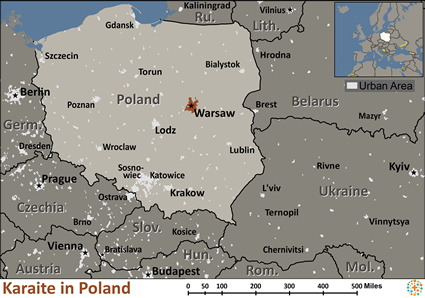Karaites are a relatively small subset of world's 15 million Jews. The Karaites reject the authority of the Oral Law of the Talmud and Mishnah. These commentaries on the Old Testament are regarded as essential to Rabbinic Jews who make up a vast majority of the Jews in the world.
The Karaite form of Judaism is so strange that Russian Tsars categorized them as non-Jews. The Karaites were able to convince the Tsar's government that no Karaites were in Palestine at the time of the crucifixion of Jesus Christ. So, they were not considered "Christ killers," as were other Jews. The Nazis of Germany followed the Russian ruling, so the Karaites were not persecuted. Thus, they escaped Russia's pogroms and the Nazi holocaust. The great Jewish medieval teacher Maimonides regarded the Karaites as Gentiles, not Jews at all.
Most Karaites migrated to Israel after the founding of the Jewish state in 1948. Very small populations of Karaites live in Eastern Europe in Russia, Lithuania, Ukraine, and Poland. A tiny group of Karaites remain in Poland. They speak Polish as their primary language and are well integrated into Polish society.
In non-religious matters, Karaites tend to adopt the language and customs of their host country. Most Karaites in Poland live in cities. Most fall into the Polish middle class working as teachers, owners of small businesses, and government administrators. As a tiny minority the Karaites try to keep a low profile. They tend to keep to themselves in social matters. Most Karaites marry within their group. Some young people marry mainstream Jews and Gentiles. Most Jewish parents have small families of two to three children. Parents encourage their children to attend universities and to enter the professions.
Karaite follow only the Tenach (Old Testament) rejecting rabbinic interpretations, which in itself is very rare for anyone with a Jewish background.
Karaites claim to be true Jews. They follow only the Tanakh, not the commentaries on the Old Testament. Some scholars link them with the ancient Sadducee sect that only accepted the Torah as authoritative.
The Karaites reject rabbinic interpretations or commentaries on the Torah and other books of the Jewish Bible. They allow each believer to make his/her own interpretation. Unlike most Jewish communities, men and women can exercise authority in their groups. They often prostrate themselves in prayer, which is rare for any Jewish community.
Still, the Karaites have important commonalities with mainstream Judaism. They observe the Sabbath. Karaites practice separation from Gentiles. They engage in ritual washing. Their prayer books come almost exclusively from passages in the Tanakh.
But just when we think we can pigeonhole the Karaites as Orthodox Jews, they surprise us. They do not wear phylacteries attached to forehead or hand in any form. Karaites believe the Scriptures refer to these only in metaphorical terms. Instead, they hide the Word of God in their thoughts and let it guide their actions.
Rabbinic Judaism accepts a matrilineal program. If one's mother is a Jew, the child is considered a Jew. The Karaites follow a patrilineal system where one's Judaism is determined by having a Jewish father.
Like all other Jews, Karaites need to understand that Jesus Christ is their Messiah. Only through Jesus can their sins be forgiven. In Christ alone is found eternal life.
Pray that Polish believers will reach out and share the gospel with their Karaite friends and neighbors.
Pray that leaders in the Karaite movement might become interested in investigating the claims of Jesus Christ.
Pray the Spirit opens the eyes of the Karaites as they read the Torah to see the prophet greater than Moses.
Pray that God brings many in the Polish Karaite community to the knowledge of their Messiah.
Scripture Prayers for the Karaite in Poland.
https://en.wikipedia.org/wiki/Karaite_Judaism
https://www.britannica.com/topic/Karaism
https://www.haaretz.com/israel-news/.premium.MAGAZINE-is-the-ancient-karaite-jewish-community-about-to-disappear-1.8879032
https://www.newworldencyclopedia.org/en
| Profile Source: Joshua Project |

























